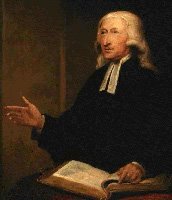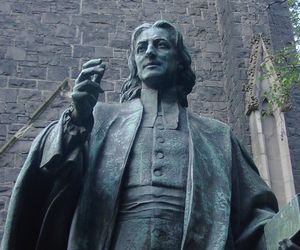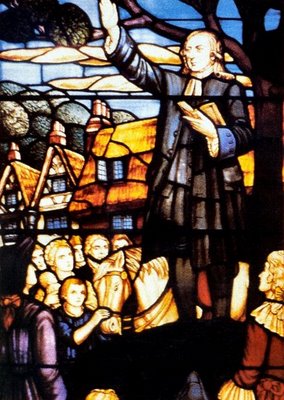 John Wesley told his evangelist trainees that when they preached, people should either get angry or get converted. No doubt, he wasn't speaking of the "Jesus loves you" gospel, but about sin, Law, righteousness, judgment and hell.
John Wesley told his evangelist trainees that when they preached, people should either get angry or get converted. No doubt, he wasn't speaking of the "Jesus loves you" gospel, but about sin, Law, righteousness, judgment and hell.The purpose of the Law is to stop the sinner's mouth of justification. The Law tells him what sin is and stops him proclaiming his own goodness. Its intent is to drive him to the cross. John Wesley said, "The first use of [the Law], without question, is to convince the world of sin. By this is the sinner discovered to himself. All his fig-leaves are torn away, and he sees that he is wretched and poor and miserable, blind and naked. The Law flashes conviction on every side. He feels himself a mere sinner. He has nothing to pay. His mouth is stopped and he stands, guilty before God."
"If doing a good act in public will excite others to do more good, then 'Let your light shine to all.' Miss no opportunity to do good."
"Give me one hundred preachers who fear nothing but sin and desire nothing but God, and I care not a straw whether they be clergymen or laymen, such alone will shake the gates of hell and set up the kingdom of God upon earth."
"I desire to have both heaven and hell in my eye."
"The very first end of the Law [is], namely, convicting men of sin; awakening those who are still asleep on the brink of hell... The ordinary method of God is to convict sinners by the Law, and that only. The gospel is not the means which God hath ordained, or which our Lord Himself used, for this end. "
"To slay the sinner is then the first use of the Law, to destroy the life and strength wherein he trusts and convince him that he is dead while he lives; not only under the sentence of death, but actually dead to God, void of all spiritual life, dead in trespasses and sins."
"...when Felix sent for Paul, on purpose that he might hear him concerning the faith in Christ; instead of preaching Christ in your sense (which would probably have caused the Governor, either to mock or to contradict and blaspheme,) he reasoned of righteousness, temperance, and judgment to come, till Felix (hardened as he was) trembled. Go thou and tread in his steps. Preach Christ to the careless sinner, by reasoning of righteousness, temperance, and judgment to come!"
 "You have nothing to do but save souls. Therefore spend and be spent in this work."
"You have nothing to do but save souls. Therefore spend and be spent in this work.""While [every true believer] cries out, Oh what love have I unto thy Law! All the day long is my study in it; he sees daily, in that divine mirror, more and more of his own sinfulness. He sees more and more clearly that he is fullness a sinner in all things that neither his heart nor his ways are right before God, and that every moment sends him to Christ. Therefore I cannot spare the Law one moment, no more than I can spare Christ, seeing I now want it as much to keep me to Christ, as I ever wanted it to bring me to Him. Otherwise this evil heart of unbelief would immediately depart from the living God. Indeed each is continually sending me to the other - the Law to Christ, and Christ to the Law."
"It is the ordinary method of the Spirit of God to convict sinners by the Law. It is this which, being set home on the conscience, generally breaketh the rocks in pieces. It is more especially this part of the Word of God which is quick and powerful, full of life and energy and sharper than any two-edged sword."
 "Before I can preach love, mercy, and grace, I must preach sin, Law and judgment."
"Before I can preach love, mercy, and grace, I must preach sin, Law and judgment."John Wesley was asked what he would do with his life if he knew that he would die at midnight the next day. His answer was something like this: "I would just carry on with what I am doing. I will arise at 5:00 a.m. for prayer, then take a house meeting at 6:00 a.m. At 12 noon, I will be preaching at an open-air. At 3:00 p.m. I have another meeting in another town. At 6:00 p.m. I have a house meeting; at 10:00 p.m. I have a prayer meeting and at 12:00 midnight, I would go to be with my Lord."
If we knew we were to die at 12 o'clock tomorrow night, would we have to step up our evangelistic efforts, or could we in all good conscience carry on just as we are?


No comments:
Post a Comment